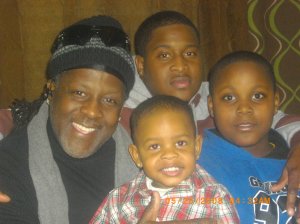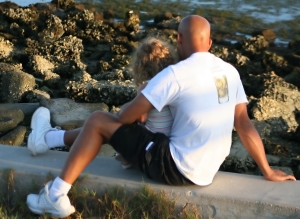
Each of us longs for the Fathers Love & Acceptance.
The absence of a mature father-child connection creates a void in the soul, a residual “father hunger.”
Father hunger is the result of receiving too little quality fathering as a child or young adult. Some argue that even grown men and women need fathers or father surrogates and that the absence of such role modeling and support is associated with less fulfillment in life. In general, father hunger results from too little intimacy between child and father.
In contemporary psychoanalytic theory, the notion of “father hunger” has been introduced by James M. Herzog to address the unconscious longing experienced by many males and females for an involved father. According to Herzog, the father plays the intrapsychic role as the modulator of aggressive drives and fantasies. Children or adults who experience father hunger yearns for a figure that can help them formulate their response to aggression and tolerate trauma.
Herzog began by studying 18- to 28-month-old boys whose night terrors were found to be associated with the loss of their fathers through separation or divorce. He suggested that these boys needed their fathers to help manage their rapprochement-stage aggressive impulses. The absence of this paternal help led the boys to turn their aggression towards their selves and then to project it in the form of their fears at night.
Herzog continued linking aggression to father loss two years later, when he noted that children of both genders had problems modulating their aggression after they had lost their fathers through divorce. This finding led him to posit a new developmental role for the father—the regulation of aggressive drive and fantasy.
“The father wound is epidemic among us,” says Gordon Dalbey. As a result, we see unfathered men growing up armored with a counterfeit of masculinity. But until their sons face the reality of their emotional abandonment, they may never seek the healing they need.
The father-wound is most often a wound of absence–emotional as well as physical. As such, it’s harder to recognize than others.
In the souls of men, the weapon of destruction is shame. When Dad doesn’t embrace, encourage, guide, and protect him, a boy grows up thinking, “Dad doesn’t value me. I must not be worth much.” He doesn’t feel like a real man, confident that he belongs in the world, with both a destiny and the power at hand to fulfill it. He feels tremendous shame and anger at being abandoned in his deepest need.
Distrusting himself and other men, he’s easily suckered into a counterfeit masculinity, from fast sex and alcohol to isolation and violence. Hence, prisons are bulging. Yet even the average, law-abiding man today hasn’t had a father who said, “You’re my son and I love you,” or who helped him discover his unique talents and abilities. As a small boy in a large world of men, he’s imprisoned by bars of shame from father-abandonment, unable to fulfill his destiny.. He’s misfocused with his muscles, intelligence and energies destructively instead of creatively.
He doesn’t want to hide his wound; he wants to heal it. He wants to face and overcome his inadequacies, so he can fulfill his calling as a man, husband, father, worker, and citizen. He’s willing to confess, “I don’t need a beer, my boss’ approval, a sexual encounter, a gun, a race to hate, or a million dollars. I need a father!”
To break the crippling generational cycle of shame and destruction, at least two steps are necessary.
First, a man must forgive his father for wounding him. Often this happens as the man dares to see the awful brokenness in his dad which fueled the wounding. A boy cries FROM his father’s wound; dad hurts you, and you cry. But a real man cries FOR his father’s wounds, feeling his dad’s pain instead of stuffing it and acting out inappropriately.
Secondly, we men need to begin fathering ourselves through a community of support. The fatherless man today can begin to trust himself and reclaim his destiny as a man among men by getting together with other men and talking honestly about his brokenness and strengths. The shame flees when you discover you’re not alone, that we’re all in this together. The wolf loves the lone sheep.
There are 7 core issues for Father Hunger: ALL LEAD TOWARD ABANDONMENT ISSUES
1.) Divorce 2.) Death 3.) Abuse 4.) Addiction 5.) Single Mothering 6.) Traditional Fathering 7.) Adoption
The chance of the 1st marriage ending in divorce is 50%, by some estimates!
Spiritual Hunger or Thirst / spiritual draught / spiritual destitution Amos 8:11 – 13
Their children enter the world like tiny sponges, ready to absorb every little impression about themselves and their identity. They are unsure of who they are: Am I special? they ask. Am I valuable? Am I good? Am I merely an annoyance? Their fathers play a primary role in answering those questions.
Just what do you mean by ‘father hunger’?
By “father hunger” I mean the profound, but usually unconscious longing for affirmation and limits from male authority figures. The most common words people use to describe their relationships with their fathers are “absence,” “sadness” and “I don’t know him.” Men have not been given the permission or the skills to pass on who they are to their children. We often know what makes fathers angry, but not the deep desires and dreams of their hearts, much less their loneliness and hurt. That vacuum creates a similar emptiness in the hearts of sons and daughters. Dad is an unnameable mystery, which only calls forth fear, doubt and sometimes endless rebellion.
Gordon Dalbey is the author of Healing the Masculine Soul and Sons of the Father: Healing the Father-Wound in Men Today. He lives in Santa Barbara, CA, and may be reached at www.abbafather.com .




